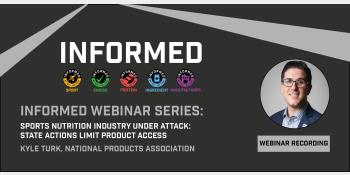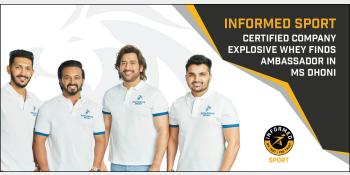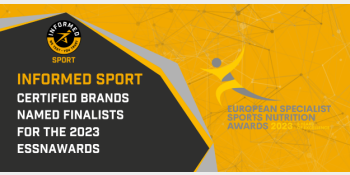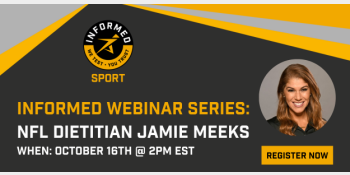INFORMED SPORT NEWS
COVID-19 and Sports: An Interview with Jamie Meeks
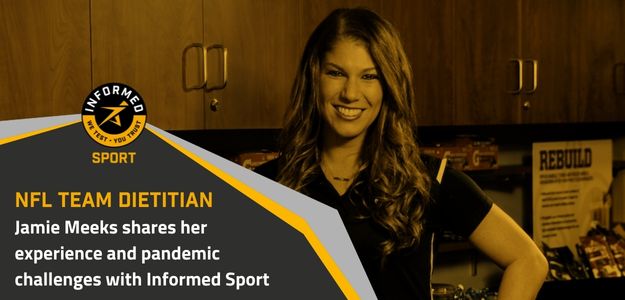
COVID-19 has affected the entire world and every industry, including the world of sports. Games aren’t being played, athletes aren’t undergoing normal training sessions and the team of people who support athletes are trying to find some sense of normalcy. This team includes the professionals who educate athletes on proper diet and nutrition: sports dietitians.
Jamie Meeks is the dietitian for the National Football League’s (NFL) New Orleans Saints. A proud graduate of Louisiana State University, Jamie went on to become the school’s first full-time dietitian before her current role with the Saints. Jamie talked with us about how life is for an NFL dietitian and how she and her team are overcoming obstacles.
Explain your job and your typical role in educating athletes.
When it comes to sports dietitians, we actually wear a lot of hats. We are very hands-on. I would say a major part of our job is the coordination of team meals, snacks and recovery nutrition for pre, mid and post-workout recovery. We work a lot with our food service in the facility coordinating meals and anything when it comes to feeding the team with different chefs around the country, hotels, airlines, stadiums, restaurants, etc. We are in constant contact with several people to get our team fed.
When it comes to education, it’s about teaching them how to eat. We educate them on how to choose their foods, meal timing and why we’re telling them to eat certain foods at certain times in the day because, in the end, they are going to be on their own. They’ll be in situations where they’re going to have to choose their own food and they have to have that background on how to choose what they’re going to eat. That’s where education comes in. It may be a one-on-one consult or it may be a team consult with a small group of guys. In the NFL, I do a lot more casual consults. They come to me and ask questions throughout the day and pick my brain so it’s kind of a variety of different ways of education, but it’s more of education on how to eat and less of telling them what to eat.
How has COVID-19 changed your normal work routine?
It has changed it 100%. Especially during this time. We are in our off-season training program and which usually begins at the end of April through mid-June. We have our players come in and they are working out. We have our new rookies come in. I’m there from 6:30 in the morning until 5 or 5:30 so it’s a long day, but it’s where they get their most intense training in to get their bodies ready for training camp in July. I know our guys are still working out, but we’re not there for face-to-face time. It’s changed everything from the way we communicate, the way we educate and the way we take care of the players. We’re trying our best to take care of whatever they need, but obviously, it’s hard when they are spread out around the country.
What are the main challenges you are facing?
We’re very hands-on when it comes to working with these guys. Not only in hands-on education but in preparing certain nutritional products, recovery shakes and working with the food service staff. Not being in person is huge. Also, we’re not able to have face-to-face contact with the guys. This is the time of year when we gain a lot of rapport and build relationships, especially with our new guys that we’ve signed, and teaching them the ways of the New Orleans Saints. My heart goes out to the rookies who are literally going to have to show up during training camp and adapt very quickly. Usually, during this time, they get to know the veteran players, get to know the coaches, and get a little bit of comfort in the new chapter of their career. Establishing that rapport, I’m not really getting that right now. I mean, I’m communicating with them electronically, but it’s just not the same.
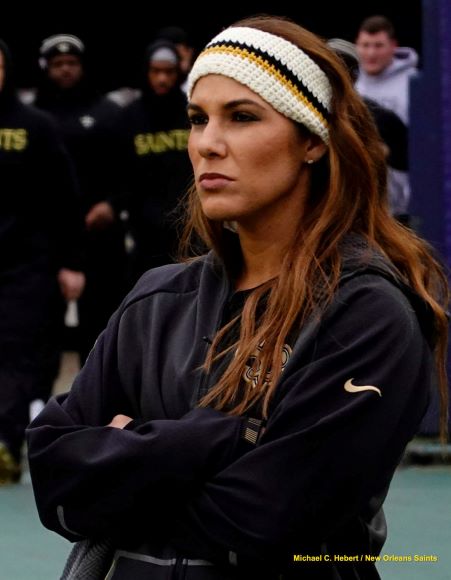
|
What are ways you still communicate with athletes and team members?
Since quarantine started, I send out an email to the entire team once a week, every week. It’s a different topic every week. This week was hydration, for example. I’ve actually been getting a lot of texts and calls from guys who were cramping up or worried about coming down to New Orleans when it’s going to be super-hot in July so my topic this week was hydration. This included giving the players tips on how to go about hydrating and rehydrating. I attached different education resources and website links. I also film myself, and my daughter helps, doing a fun recipe and send that to the guys just to give them some fun ideas of what they can be eating right now. We do that via email. From those emails, they can call, text or email me back with different questions or concerns. That may spark a topic for the next week. We also have our weekly team meetings with coaches on the call and staff meetings. We’re doing pretty well at communication. Our strength coaches have been good about sending workouts to the guys. Again, we’re doing the best we can.
What recommendations are you providing to athletes while they’re at home?
A big topic is supplements and how to correctly and safely choose supplements. Make sure they’re certified. Don’t just take supplements just to take them. A supplement actually has a purpose. I give them ways to portion out their foods, pre-workout nutrition, post-workout recovery, grocery shopping and how to order healthy at restaurants. Those are some of the topics we’ve been touching on. A lot of the guys have responded and are very thankful for it.
What recommendations do you have for other dietitians experiencing similar challenges as you?
First and foremost, stay calm and don’t panic. I know a lot of dietitians are thinking about when we get back into things and “how is it going to be?” Calm down, let it pan out. It will work out. Everybody’s in the same boat.
Also, rely on your colleagues. I had a Zoom meeting last night with almost 20 dietitians, both collegiate and professional, throwing around ideas and talking about some of the issues we’ve been having. From that meeting, I got we are all experiencing the same issues. Communicate as much as possible and it will pan out.
How are athletes training during COVID-19? Are you having to adjust their nutritional needs since many aren’t performing at their usual level?
When it comes to our team, all the guys are on their own right now. Our strength coaches do provide a workout each week for them, but when it comes to where they’re working out, it depends on each individual. Some have access to gyms and training facilities. Some have home gyms. Some are at parks running.
As far as nutrition, maybe they are working out as harder as or even harder than normal because they have more time. Our head coach told the team, “just come back in the best shape of your life.” He means that. Whenever our head coach says something, the players really do take it to heart. I believe and trust that the majority of them will come back in very good shape. When it comes to nutritional needs, I’m doing that on an individual basis. Were kind of monitoring their weights. They send their weigh-ins to the strength coach each week. If we see a big dip or a big jump, we will reach out to them. As of now, everybody seems to be stable and doing well.
Do you foresee challenges when going back to work? Athlete nutrition, performance, etc.?
This time is when we get everybody on a nice regimen and they know the way we handle things when it comes to recovery, nutrition and just what we have available and what we have to offer from the nutrition program. They’re going to arrive and we’re literally going to have to teach from scratch in a very short amount of time. I foresee that being a challenge; not only the grind of training camp but then also to get these guys up to speed on how we do things and get them on a good regimen. Many may already have their own regimen, which is totally fine so then it will take me to learn what that particular player needs. It’ll take both sides, but I’m confident we will be okay.
|
|
What other aspects have you noticed about the industry that are impacted?
The biggest thing is the unknown. How were going to go about feeding our guys? In a facility cafeteria, it’s typically buffet style so that type of feeding is going to have to change. We’re going to have to set policies and strategies on how to do that. Not only our facility, but airlines and hotels are going to have different policies on the way they’re going to feed so we’re going to have to adapt to those policies. Even with stadiums, we usually bring in restaurants and vendors to feed the team after the game. Are vendors or restaurants going to even be allowed in the stadium? So logistics is probably the biggest unknown right now that we’re trying to figure out.
How important is nutrition? Not just to athletes, but all supplement users?
I think people need to understand that the foundation of a truly healthy lifestyle starts with nutrition. It ultimately comes down to a good nutritious diet. It can help reduce the risk of chronic disease, help you have a healthy weight and just, overall, promote good health and well-being. I always tell the athletes “yes, I’m a dietitian, but dietitians don’t just help people lose weight.” Nutrition isn’t just about weight loss, it’s about helping people become healthier people.
Any tips for everyone at home?
Try to stay on a schedule. When you wake up, change into normal clothes. Try to stay on an eating regimen. If you typically eat lunch or a snack at a certain time, stick to that schedule so you’re not snacking all day. When you’re at the grocery, don’t buy junk food. Buy fresh fruits and vegetables and healthy lean proteins so you can have those readily available. Try to get good sleep. I know it’s a stressful time, but sleep is important. Obviously, staying active. Whether it’s just walking around the neighborhood or doing home video workouts. Staying active is huge.
Even during quarantine, why is it important to have supplements tested by a third party, like Informed Sport?
Especially during this time, it’s important. For the health and safety of the individual to make sure they’re getting a good, quality product and to make sure they’re not consuming anything that’s going to harm them. You know the label might look good, but if something has been contaminated, you don’t know. Having something that is third-party certified will benefit them. For those who are athletes, making sure there are no banned ingredients in there because they are still getting drug tested and they do not want to test positive for anything that’s banned. Again, it’s not just about testing positive, but it could be harmful ingredients and we’re looking out for the health and safety of these people.







